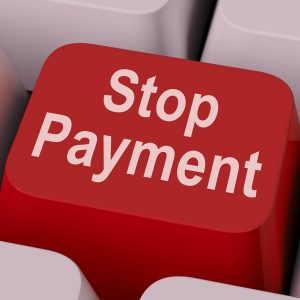How To Halt Wage Garnishment
Filed under: bankruptcy
 Wage garnishment is a legal procedure that allows for a portion of your earnings to be automatically deducted to pay a debt. In some states, creditors may garnish up to 25% of your disposable income. Disposable income is gross income minus deductions required by law, such as taxes or retirement contributions. While having a portion of your paycheck taken to pay an unresolved debt can be financially hard, there are instances in which they can even be garnished without your consent.
Wage garnishment is a legal procedure that allows for a portion of your earnings to be automatically deducted to pay a debt. In some states, creditors may garnish up to 25% of your disposable income. Disposable income is gross income minus deductions required by law, such as taxes or retirement contributions. While having a portion of your paycheck taken to pay an unresolved debt can be financially hard, there are instances in which they can even be garnished without your consent.
What types of debts can be garnished?
The most common type of debt that will lead to wage garnishment are unpaid spousal or child support, tax debts, and student loan debts. Although these debts are the most common type of debt to lead to a garnishment, they are not the only ones. Further, the garnishment process can take time, giving you a chance to resolve your debt before the garnishment order take effect.
How are wages garnished?
To garnish your wages, a creditor must first get a court judgment. The creditor must inform you of the garnishment before beginning the process. This allows you the opportunity to contest the garnishment. If you do not contest the judgment, it will become permanent and your wages will be garnished until the debt is resolved. However, there are ways to stop a garnishment.
How do I stop a garnishment?
You can contest the garnishment order, which may be able to get you a hearing. At the hearing, you may be able to stop the garnishment, and reduce how much is garnished. You can pay the debt back to the creditor; but, chances are may not be able to repay the debt which is why your wages are at risk of garnishment to begin with. You can also consult a bankruptcy attorney on how they may be able to help you halt the garnishment process and resolve your debts.
you have been sued by a creditor or are having problems paying your debts, talk to a Houston bankruptcy attorney to learn more about the options available to you.
Disclaimer: This blog post is for general informational purposes only and does not constitute legal advice. Your specific situation may vary. Please consult with an attorney at Baker & Associates to discuss your particular case.

